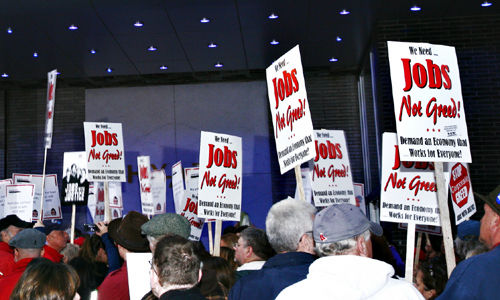
“The need for massive job creation should trump fear of large federal budget deficits expressed in opinion polls,” declared a top AFL-CIO analyst this week.
Thea Lee, the labor federation’s policy director, recently named deputy chief of staff by AFL-CIO President Richard Trumka, said the deficits are actually necessary now because only government spending can provide the short term boost in demand and the job creation that results from it since the private sector has yet to increase its demand for goods and services.
She made her remarks at the Oct. 21 conference of the new America Foundation in Washington D.C.
Speakers at the gathering said 27-29 million new jobs must be created in the next decade to make up for the 8-million jobs lost during the current crash and to absorb young people coming into the labor market.
Lee and others who spoke said that a single-minded focus on simply reducing the deficit would prevent addressing the “abysmal labor marker,” the $12-14 billion housing bust,” “sky high bankruptcies,” and “30 years of stagnating real wages.”
Given the gloomy economic picture, Lee called for a second stimulus package on top of the $787 billion stimulus law signed earlier this year by the president.
She rejected the argument that since most of the money in the first package has yet to be spent, it is too early for a second stimulus. “Given the economic disaster workers face, that is not a reason to wait,” she declared.
Lee said she “would put state and local spending high in a second stimulus package because it acts quickly and saves jobs quickly and because it helps clients of state and local governments – people who need it the most.
States, unlike the federal government, must balance their budgets every year. Combined, they face a $578 billion deficit, by 2012. Without a second stimulus, Lee noted, there will be severe cuts in the number of police, firefighters and teachers. “These are the cuts that hurt people at the bottom the most,” she said. “There are a lot of teachers who taught summer school these past months or who have smaller class sizes now because of that first stimulus.”
Almost all the speakers at the conference said a top priority for the second stimulus package should be increased spending on infrastructure including roads, schools, bridges, railroads, airports, broadband and modernization of the electrical grid.
Gov. Ed Rendell, D-Pa., and Rep. Rosa DeLauro, D-Conn., pushed long-range infrastructure projects while Lee emphasized more immediate construction.
“We need 2-year construction projects that can be started tomorrow,” she said.
DeLauro urged formation of a National Infrastructure Bank to float billions in bonds for construction.
Lee suggested taking the remaining $200 billion from the bank bailout and putting it into immediate infrastructure repair projects.
She said that the best way of creating a long range boost in demand and ensure that the economy keeps moving is to increase the purchasing power of workers. (Many speakers noted that consumer purchases account for 70 percent of the economy.)
“The best way to boost worker buying power,” Lee declared, “is to increase worker bargaining power through labor law reform, specifically passing the Employee Free Choice Act.”
Lee said she rejects the argument of “those who claim that the economy is not strong enough to do labor law reform, health care reform, et., etc., etc. I turn that around. How the hell do you think we got into this mess in the first place?
“The crash happened because private enterprise ran amok with no counterveiling check from worker power and because the health insurers are little r3egulated and can raise rates, co-pays and premiums and deny care at will.
“We ended the post-2001 recovery with lower wages than when it started, less health care and anemic growth. We need labor law reform so that workers can gain their fair share of economic output,” Lee declared.

MOST POPULAR TODAY

Zionist organizations leading campaign to stop ceasefire resolutions in D.C. area

High Court essentially bans demonstrations, freedom of assembly in Deep South


Communist Karol Cariola elected president of Chile’s legislature

U.S. imperialism’s ‘ironclad’ support for Israel increases fascist danger at home






Comments